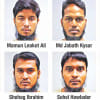'They formed cell, met in parks, shared radical contents'
The eight Bangladeshi workers held recently in Singapore had allegedly formed an “Islamist” cell that met in parks and other open fields and shared radical “propaganda” and videos.
The Bangladeshis have recently been detained on charges of plotting to launch attacks and overthrow the government back home.
The group had an organisational structure and its leader, deputy leader and other members had individual roles, according to a new statement of Singapore's home affairs ministry posted on its website yesterday.
The authorities issued a two-year detention order for the eight men who they say were members of a group called Islamic State in Bangladesh (ISB).
The order was issued under Singapore's colonial-era internal security act, which allows suspects to be held for lengthy periods without trial, reports Reuters.
One of the detainees, Mizanur Rahman, who allegedly formed the so-called ISB, started becoming radicalised after reading radical materials online around 2013, said the statement.
He became more radicalised after a Bangladeshi shared ISIS propaganda material with him when he was in Bangladesh last year, it claimed.
Asked whether the authorities concerned would consider blocking "certain sites" used for radicalisation of people, Singapore Home Minister K Shanmugam yesterday said, "I think blocking sites on the Internet is not an easy thing to do, we have to recognise that.
“We have to put a lot of emphasis on education, inoculation, but also recognise different people who face different influences. These ideas are sweeping the world and the entire region, including Singapore," he said, reports our New Delhi correspondent, quoting a PTI report from Singapore.
Members of the so-called ISB, formed in Singapore in March, had identified several possible targets in Bangladesh, which include lawmakers, ministers, and media personnel, according to a kill-list released on the Singapore home ministry website earlier.
In a document titled “We Need for Jihad Fight”, which was recovered from detained Mizanur Rahman, the group also listed military targets such as the Border Guard Bangladesh (BGB), the air and navy forces and the Rapid Action Battalion (Rab).
Our New Delhi correspondent added that K Shanmugam, the Singapore minister, also said, "They [the Bangladeshis] were looking at bomb-making, they have material on sniper rifles, they have collected money and they have a list of targets.”
Months after deporting 26 “radicalised” Bangladeshi workers, Singapore arrested the eight Bangladeshis recently.
Besides, another five Bangladeshis were deported for suspected militancy link. They were arrested from Banasree area in Dhaka on Tuesday.
A Dhaka court yesterday placed them on a seven-day remand each after police produced them before the court with 10 days' remand pleas.
A DB official said they were making profiles of the arrestees and that they would be quizzed about their suspected militancy links.
The latest Singapore home affairs ministry statement said the five Bangladeshis were not a part of the Islamic State in Bangladesh group but had been found in possession of jihadi materials or to have supported the use of armed violence for a “religious cause”.
There was no indication that the detainees were members of the Bangladeshi “radical group” whose members were arrested last year. But some of them were acquaintances, the statement claimed.
It also said, “The uncovering of the Islamic State of Bangladesh (ISB) group in Singapore sends a strong signal that we cannot take our security for granted or be complacent.
“At the time of his arrest, Mizanur worked as a draftsman in a local construction firm. He had been working on-and-off in Singapore since 2007 and when he last entered Singapore in December 2015, the authorities had no information to suggest that he had radical views.”
Several of the arrestees were liable to be prosecuted for “terrorism-financing” and at the time of the arrests, the funds they had was raised from the members' “own contributions”, said the statement.
“The Bangladeshi nationals in both incidents [arrested in the last one year] were not known to have targeted Singapore at the time of their arrests.
“They are not known to have acted on their plans to procure firearms yet.”
The statement added that the Bangladeshi authorities had been informed of the group and its activities, and had been helpful in providing some information.
Contacted, a DB official, who is investigating the matter, said since the arrests have been made in connection with militancy, the issue was a matter of “serious security threat” and related to the image of Bangladesh.
He also said they would visit Singapore to collect information and interrogate the arrestees if they were not deported soon.

 For all latest news, follow The Daily Star's Google News channel.
For all latest news, follow The Daily Star's Google News channel. 








Comments